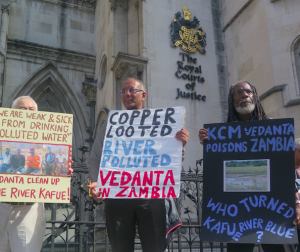 5th July 2017. The latest hearing in the case of the Chingola communities consistently polluted by Vedanta subsidiary Konkola Copper Mines (KCM) began at the Court of Appeals in London today. A rally organised by Foil Vedanta with Pan African solidarity groups took place outside the court in solidarity with the victims of ongoing pollution who have been fighting legal battles for justice in Zambia, and now the UK, for eleven years.
5th July 2017. The latest hearing in the case of the Chingola communities consistently polluted by Vedanta subsidiary Konkola Copper Mines (KCM) began at the Court of Appeals in London today. A rally organised by Foil Vedanta with Pan African solidarity groups took place outside the court in solidarity with the victims of ongoing pollution who have been fighting legal battles for justice in Zambia, and now the UK, for eleven years.
See the video from today’s rally here!
Activists from Pan African Society Community Forum (PASCF), Women of Colour in Global Women’s Strike and London Mining Network joined Foil Vedanta today to rally outside the Royal Courts of Justice calling for justice for thousands of Zambian villagers polluted by UK firm Vedanta Resources, and echoing their demands. The protesters sat in the public gallery of the court which was packed with observers and press.
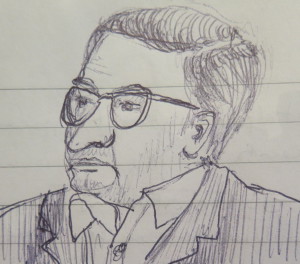
Inside the court Vedanta’s lawyers began their appeal against a May 2016 decision to allow the villagers’ case to be heard in the UK, arguing that Vedanta has no duty of care to claimants potentially polluted by subsidiary KCM. The case Dominic Liswaniso Lungowe vs Vedanta Resources and Konkola Copper Mines is being heard by Lord Justice Jackson, Lord Justice Simon and Mrs Justice Asplin and may continue for several days. Vedanta’s company secretary Deepak Kumar attended the hearing along with Geoffrey Green, a non executive director and former partner in law firm Ashurst LLP.
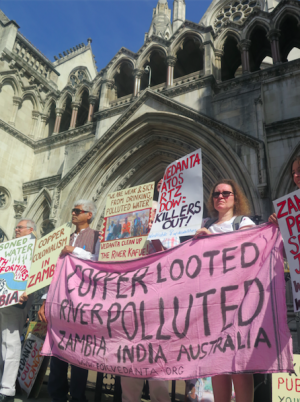 The claimants, represented by UK law firm Leigh Day, are from farming and fishing communities downstream of KCM’s mines and plants. They have suffered continual pollution since UK firm Vedanta Resources bought KCM in 2004. In 2006 a major pollution spill hospitalised hundreds who drank River Kafue water containing 10 x acceptable levels of copper, 770 x manganese and 100 x cobalt. They filed a law suit in 2007 and were awarded a landmark $2 million fine in 2011 in the Zambian High Court, but KCM appealed and in 2015 the Supreme Court upheld the guilty verdict but removed all compensation. As a result the victims took their case to UK lawyers.
The claimants, represented by UK law firm Leigh Day, are from farming and fishing communities downstream of KCM’s mines and plants. They have suffered continual pollution since UK firm Vedanta Resources bought KCM in 2004. In 2006 a major pollution spill hospitalised hundreds who drank River Kafue water containing 10 x acceptable levels of copper, 770 x manganese and 100 x cobalt. They filed a law suit in 2007 and were awarded a landmark $2 million fine in 2011 in the Zambian High Court, but KCM appealed and in 2015 the Supreme Court upheld the guilty verdict but removed all compensation. As a result the victims took their case to UK lawyers.
On 27th May 2016 the Hon Justice Coulson awarded 1,826 Chingola villagers the right to have their case demanding compensation for personal injury and loss of livelihood due to gross pollution heard in the UK. The judgment stated that KCM and parent company Vedanta had attempted to pervert the course of justice in Zambia, and claimed KCM could even declare insolvency in Zambia to avoid paying victims, noting the company’s financial secrecy and historic dishonesty as exposed in a previous UK judgment in 2014.
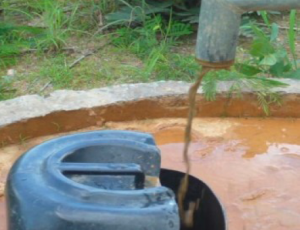
A Chingola resident and claimant in the case who did not want to be named said:
“The case has dragged on for far too long. Meanwhile lives have been lost due to the pollution and the surviving families are still suffering. In December the World Bank lent Zambia $100 million to deal with mining pollution. This confirms the scale of the problem. The affected people should be compensated immediately.”
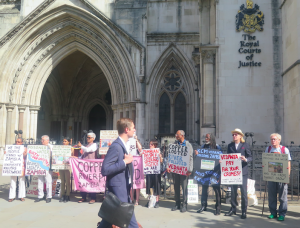 Recent news coverage has detailed the ongoing pollution, sickness and poverty suffered by the affected communities. Protesters outside and inside the Court decried the British company’s complete disregard for human rights and environment, and echoed the community’s demands for KCM to:
Recent news coverage has detailed the ongoing pollution, sickness and poverty suffered by the affected communities. Protesters outside and inside the Court decried the British company’s complete disregard for human rights and environment, and echoed the community’s demands for KCM to:
- Stop polluting the rivers immediately. Close down the plant until pollution control measures are replaced and upgraded.
- Provide clean water to the villages immediately, by tankers or pipes.
- De-silt the Mushishima stream and Kafue River and remove contaminated waste.
- Remediate the entire polluted area to make it safe to live, farm and fish there again.
- Compensate the affected people for loss of health and livelihood. All medical costs should be paid by KCM/Vedanta in future.
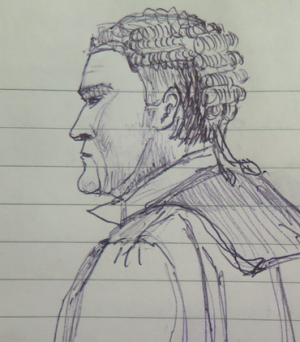
Samarendra Das from Foil Vedanta said:
“The environmental racism of copper mining companies, and the impunity they enjoyed during Rhodes’ British South African Company era is continuing to haunt Zambia through the colonial legacy issues of KCM/Vedanta. It is time that justice is delivered. The Kafue River must be cleaned up, and the eleven years of suffering of pollution affected communities must stop.”
If the appeal is rejected the case will be a precedent for holding a UK mining company responsible for the actions of its subsidiary.